Abstract
In the course of a controlled study to evaluate different forms of immunotherapy for subjects with insect-sting hypersensitivity, we observed 11 subjects who had systemic cutaneous urticarial reactions and 3 subjects who experienced systemic anaphylaxis. With the exception of tachycardia, there were no cardiopulmonary changes in the subjects with urticaria, whereas the major manifestation of anaphylactic shock in the other three subjects was severe hypotension that was probably secondary to peripheral vasodilation. Significant abnormalities in gas exchange developed in two subjects. In one, bronchospasm precipitated a respiratory arrest followed by endotracheal intubation with mechanical ventilation. Although plasma histamine levels were not related to the development of cutaneous reactions, the plasma histamine levels correlated with the severity and duration of the cardiopulmonary changes observed during anaphylactic shock. The two subjects with the most severe shock showed evidence of intravascular coagulation characterized by a diminution of Factor V, Factor VIII, fibrinogen, and high molecular weight kininogen, as well as changes in components of the complement system. Standard therapy with epinephrine and fluids, usually recommended for the treatment of systemic anaphylaxis, did not immediately reverse either the hemodynamic or the respiratory abnormalities in the two subjects with the most severe anaphylactic shock. Hemodynamic recovery was gradual and did not seem directly related to any specific therapeutic intervention.
Full text
PDF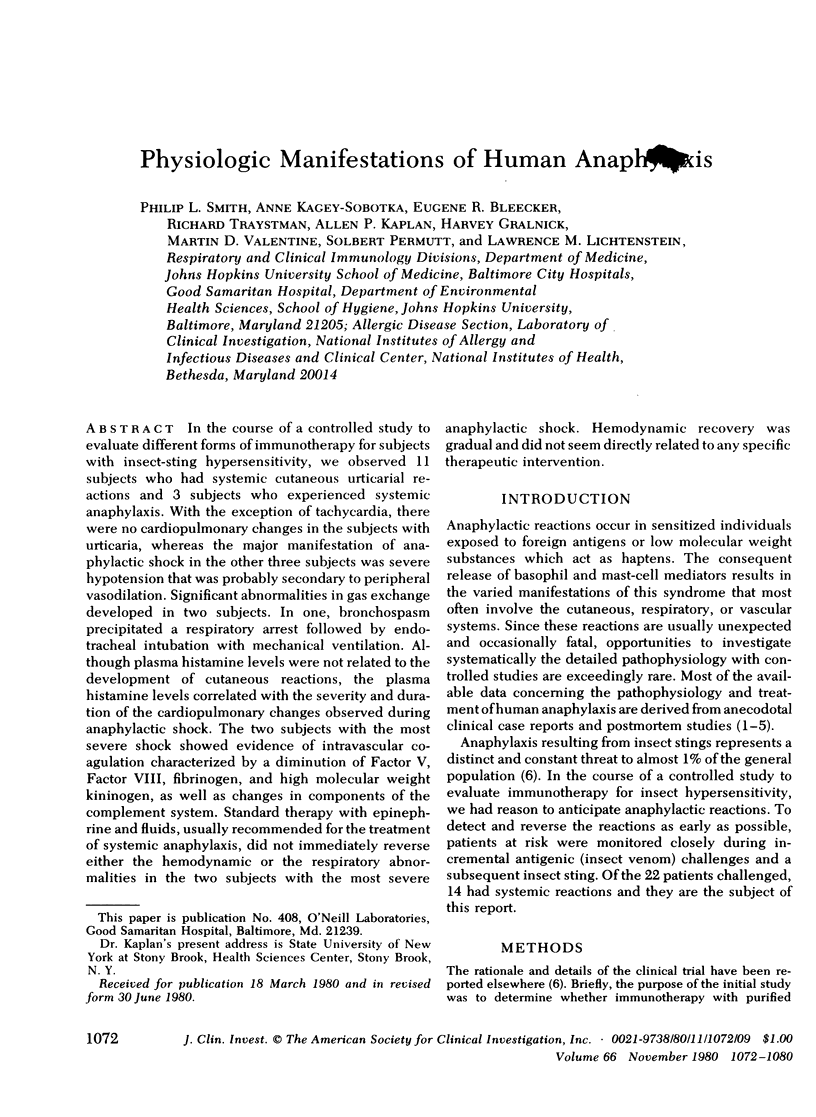
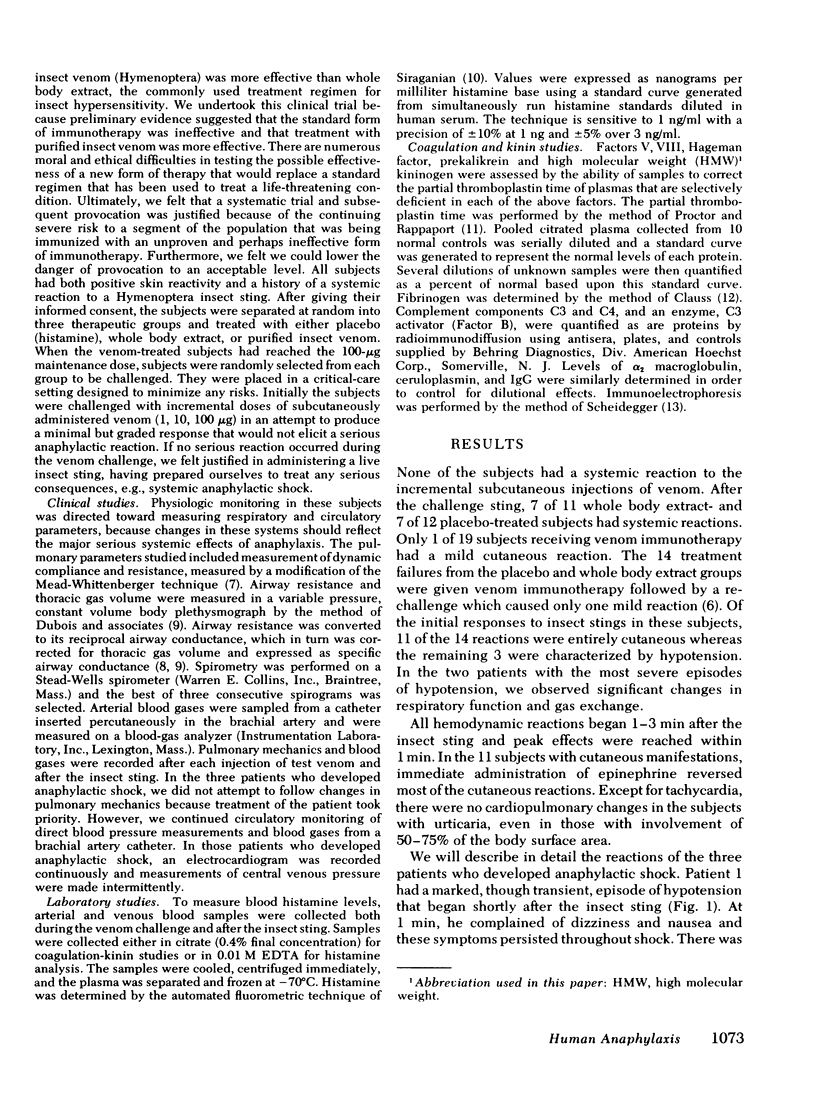
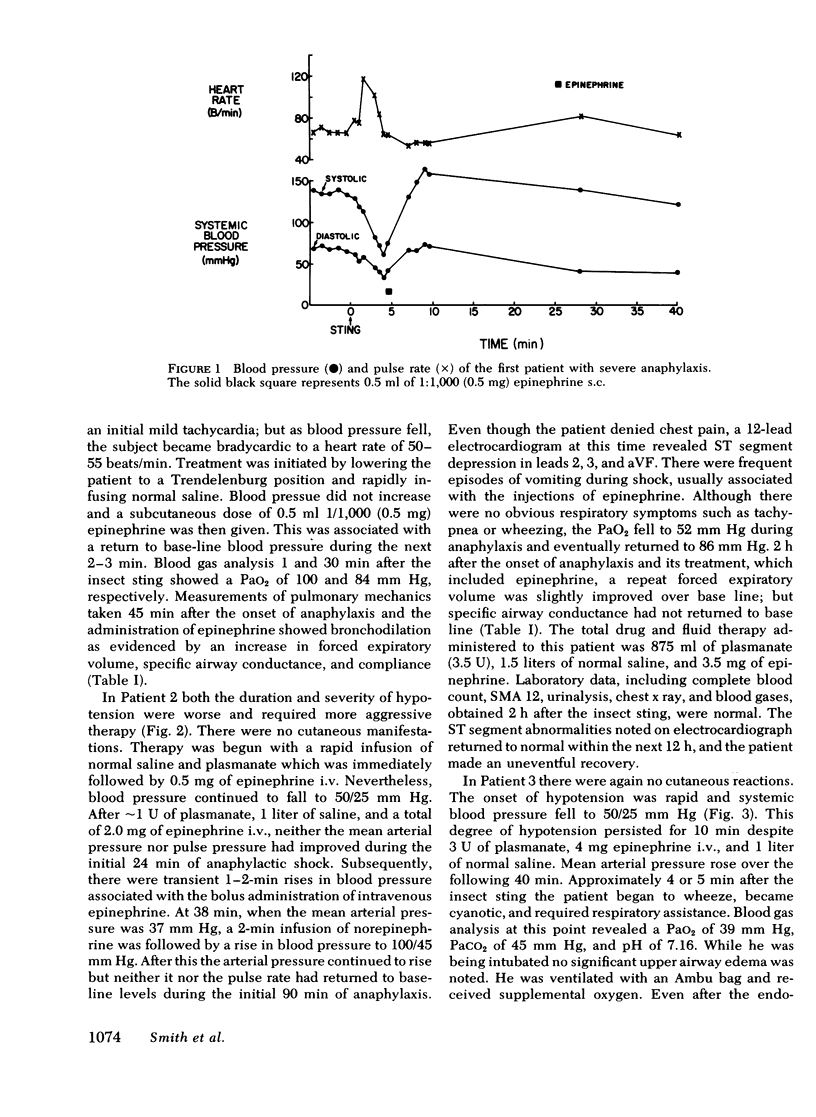
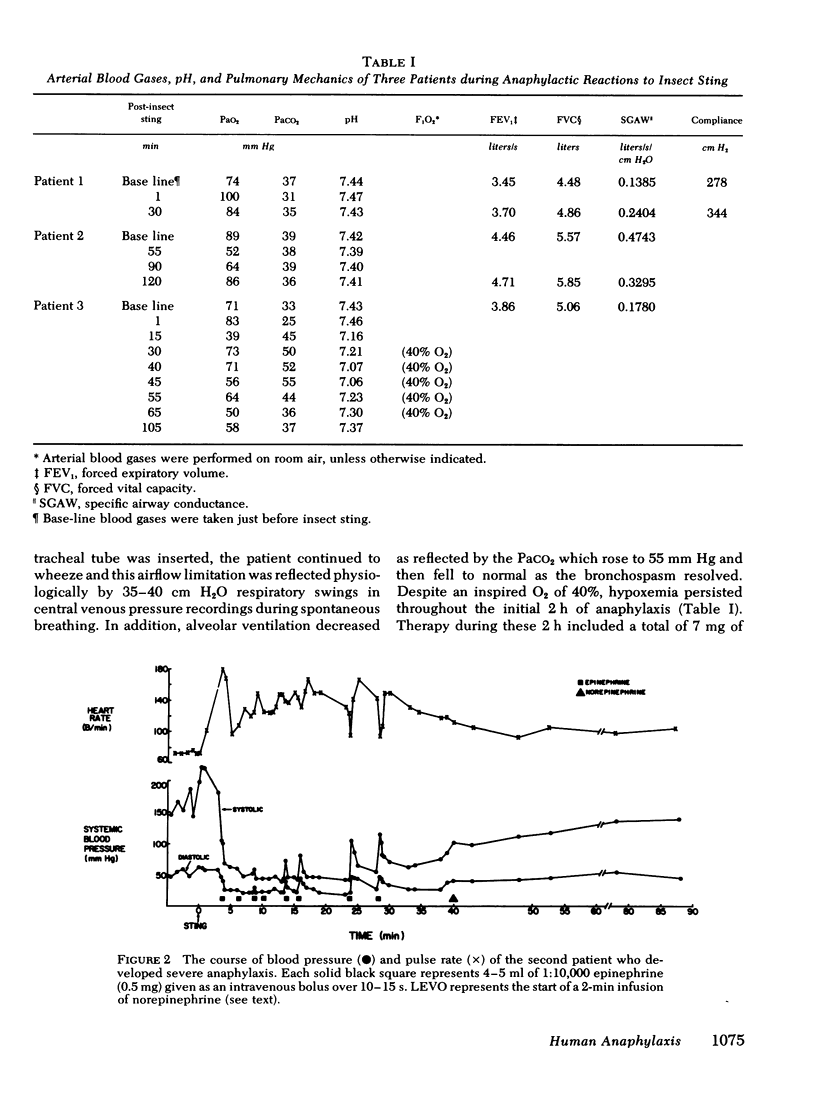
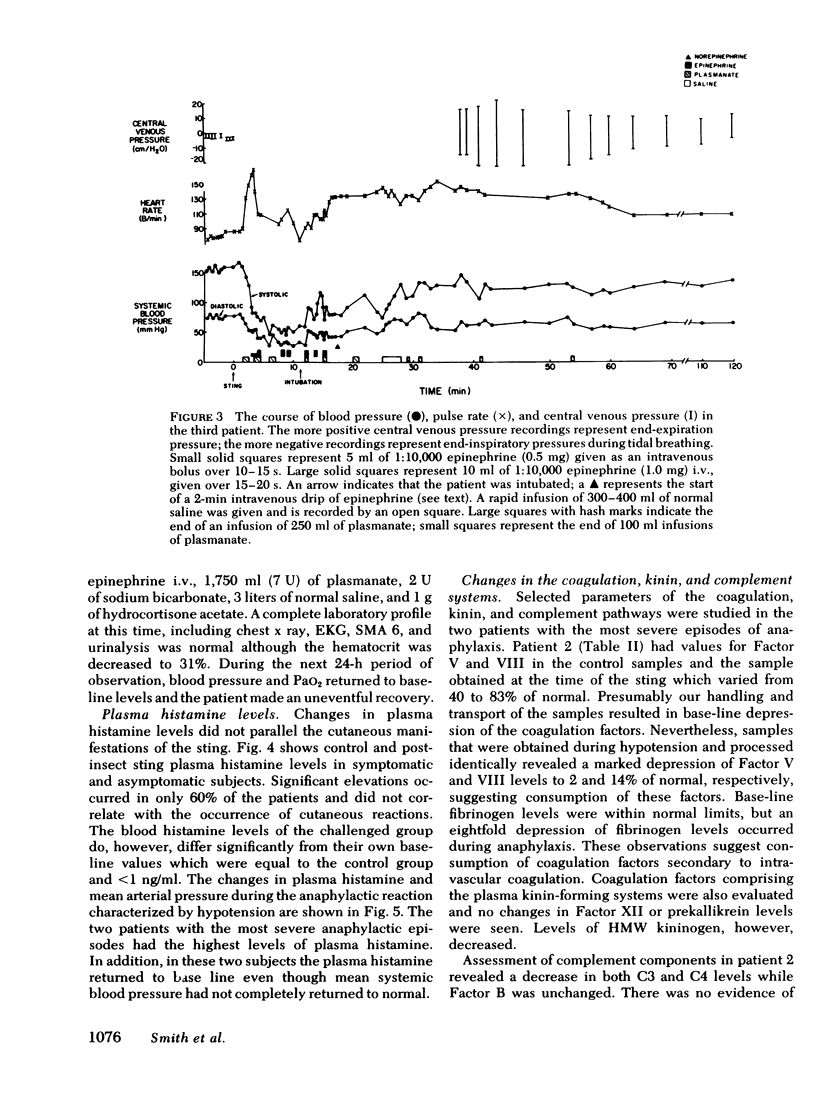
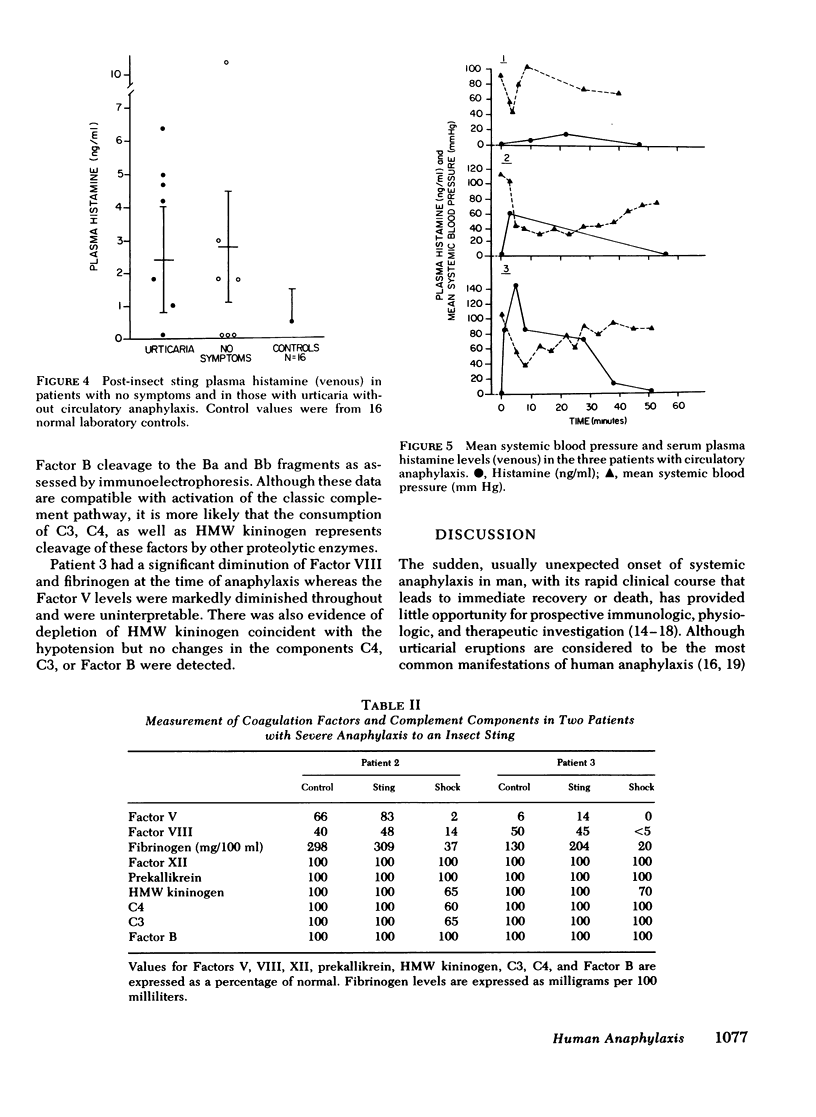
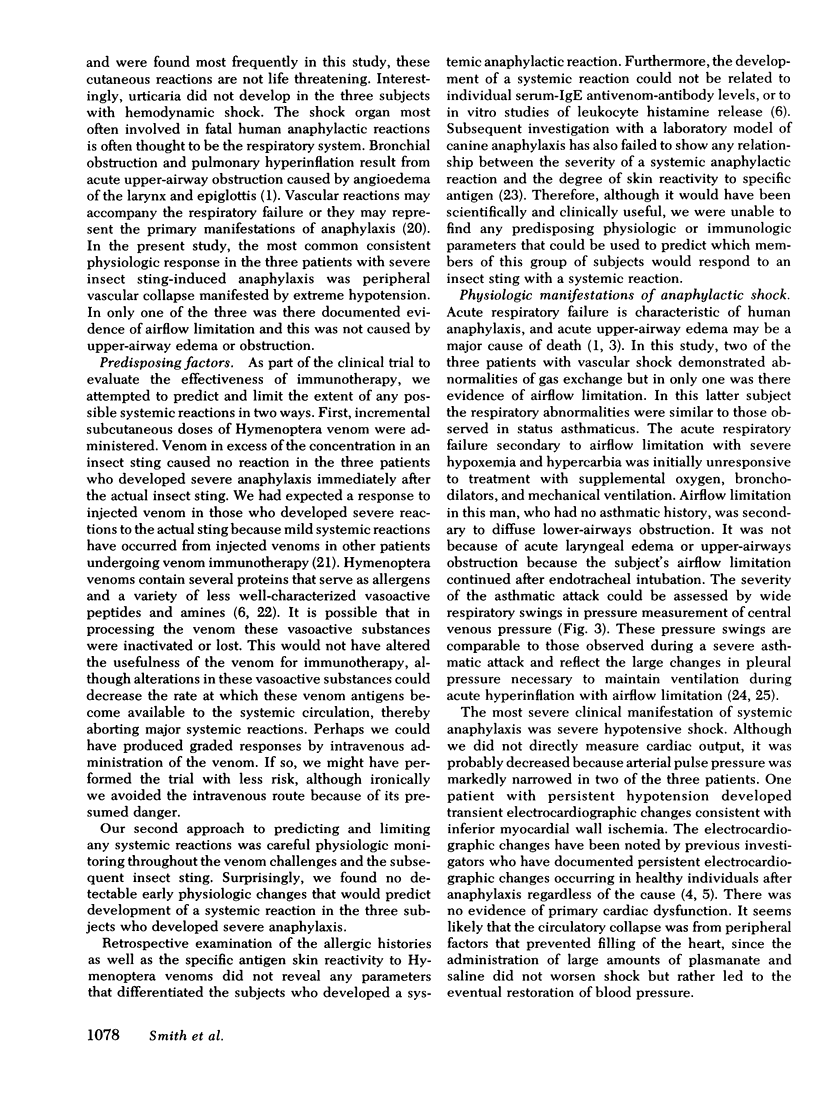
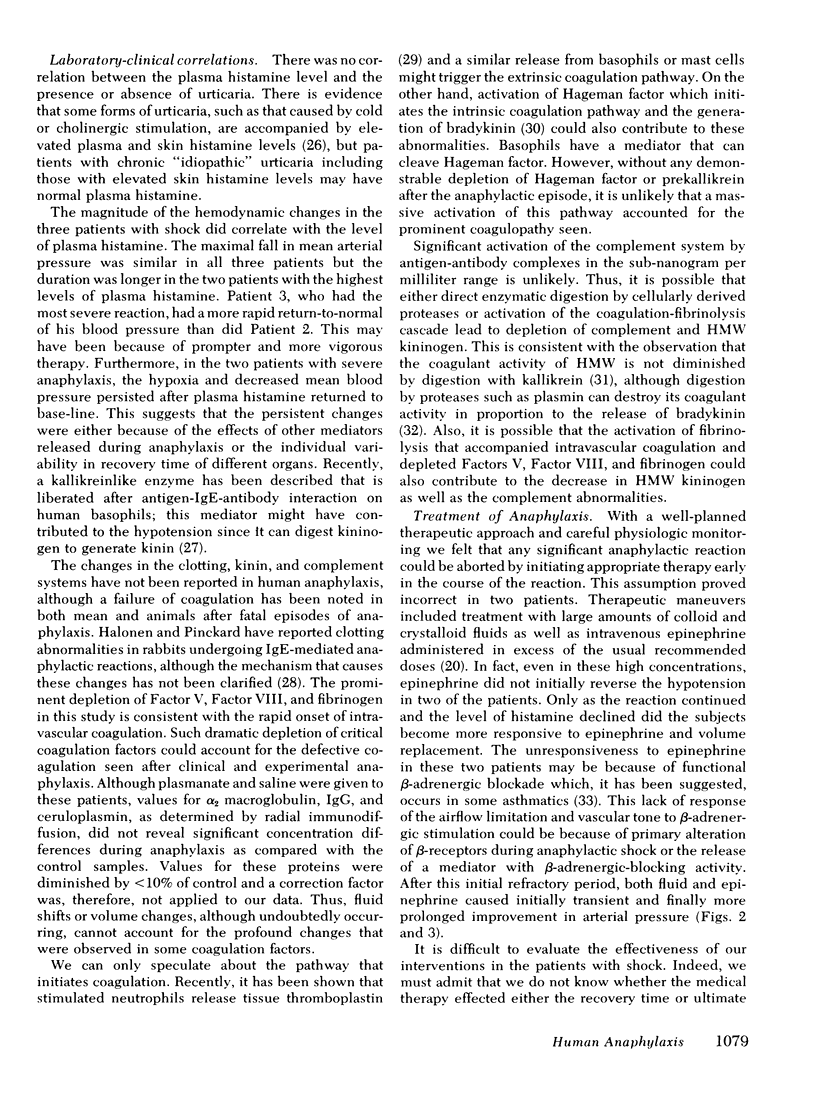
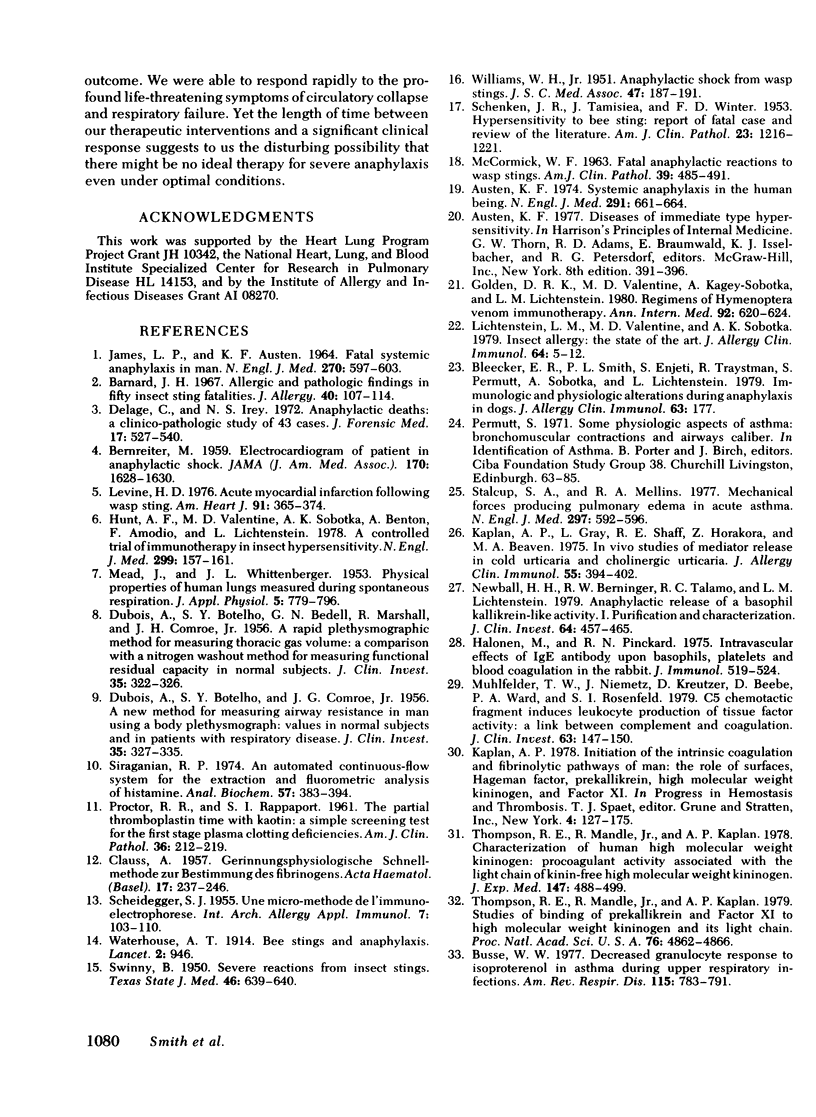
Selected References
These references are in PubMed. This may not be the complete list of references from this article.
- Austen K. F. Systemic anaphylaxis in the human being. N Engl J Med. 1974 Sep 26;291(13):661–664. doi: 10.1056/NEJM197409262911306. [DOI] [PubMed] [Google Scholar]
- Barnard J. H. Allergic and pathologic findings in fifty insect-sting fatalities. J Allergy. 1967 Aug;40(2):107–114. doi: 10.1016/0021-8707(67)90104-9. [DOI] [PubMed] [Google Scholar]
- Busse W. W. Decreased granulocyte response to isoproterenol in asthma during upper respiratory infections. Am Rev Respir Dis. 1977 May;115(5):783–791. doi: 10.1164/arrd.1977.115.5.783. [DOI] [PubMed] [Google Scholar]
- CLAUSS A. Gerinnungsphysiologische Schnellmethode zur Bestimmung des Fibrinogens. Acta Haematol. 1957 Apr;17(4):237–246. doi: 10.1159/000205234. [DOI] [PubMed] [Google Scholar]
- DUBOIS A. B., BOTELHO S. Y., BEDELL G. N., MARSHALL R., COMROE J. H., Jr A rapid plethysmographic method for measuring thoracic gas volume: a comparison with a nitrogen washout method for measuring functional residual capacity in normal subjects. J Clin Invest. 1956 Mar;35(3):322–326. doi: 10.1172/JCI103281. [DOI] [PMC free article] [PubMed] [Google Scholar]
- DUBOIS A. B., BOTELHO S. Y., COMROE J. H., Jr A new method for measuring airway resistance in man using a body plethysmograph: values in normal subjects and in patients with respiratory disease. J Clin Invest. 1956 Mar;35(3):327–335. doi: 10.1172/JCI103282. [DOI] [PMC free article] [PubMed] [Google Scholar]
- Delage C., Irey N. S. Anaphylactic deaths: a clinicopathologic study of 43 cases. J Forensic Sci. 1972 Oct;17(4):525–540. [PubMed] [Google Scholar]
- Golden D. B., Valentine M. D., Kagey-Sobotka A., Lichtenstein L. M. Regimens of Hymenoptera venom immunotherapy. Ann Intern Med. 1980 May;92(5):620–624. doi: 10.7326/0003-4819-92-5-620. [DOI] [PubMed] [Google Scholar]
- Halonen M., Pinckard R. N. Intravascular effects of IgE antibody upon basophils,, neutrophils, platelets and blood coagulation in the rabbit. J Immunol. 1975 Aug;115(2):519–524. [PubMed] [Google Scholar]
- Hunt K. J., Valentine M. D., Sobotka A. K., Benton A. W., Amodio F. J., Lichtenstein L. M. A controlled trial of immunotherapy in insect hypersensitivity. N Engl J Med. 1978 Jul 27;299(4):157–161. doi: 10.1056/NEJM197807272990401. [DOI] [PubMed] [Google Scholar]
- JAMES L. P., Jr, AUSTEN K. F. FATAL SYSTEMIC ANAPHYLAXIS IN MAN. N Engl J Med. 1964 Mar 19;270:597–603. doi: 10.1056/NEJM196403192701202. [DOI] [PubMed] [Google Scholar]
- Kaplan A. P., Gray L., Shaff R. E., Horakova Z., Beaven M. A. In vivo studies of mediator release in cold urticaria and cholinergic urticaria. J Allergy Clin Immunol. 1975 Jun;55(6):394–402. doi: 10.1016/0091-6749(75)90078-0. [DOI] [PubMed] [Google Scholar]
- Kaplan A. P. Initiation of the intrinsic coagulation and fibrinolytic pathways of man: the role of surfaces, hageman factor, prekallikrein, high molecular weight kininogen, and factor XI. Prog Hemost Thromb. 1978;4:127–175. [PubMed] [Google Scholar]
- Levine H. D. Acute myocardial infarction following wasp sting. Report of two cases and critical survey of the literature. Am Heart J. 1976 Mar;91(3):365–374. doi: 10.1016/s0002-8703(76)80222-0. [DOI] [PubMed] [Google Scholar]
- Lichtenstein L. M., Valentine M. D., Sobotka A. K. Insect allergy: the state of the art. J Allergy Clin Immunol. 1979 Jul;64(1):5–12. doi: 10.1016/0091-6749(79)90075-7. [DOI] [PubMed] [Google Scholar]
- Muhlfelder T. W., Niemetz J., Kreutzer D., Beebe D., Ward P. A., Rosenfeld S. I. C5 chemotactic fragment induces leukocyte production of tissue factor activity: a link between complement and coagulation. J Clin Invest. 1979 Jan;63(1):147–150. doi: 10.1172/JCI109269. [DOI] [PMC free article] [PubMed] [Google Scholar]
- Newball H. H., Berninger R. W., Talamo R. C., Lichtenstein L. M. Anaphylactic release of a basophil kallikrein-like activity. I. Purification and characterization. J Clin Invest. 1979 Aug;64(2):457–465. doi: 10.1172/JCI109483. [DOI] [PMC free article] [PubMed] [Google Scholar]
- PROCTOR R. R., RAPAPORT S. I. The partial thromboplastin time with kaolin. A simple screening test for first stage plasma clotting factor deficiencies. Am J Clin Pathol. 1961 Sep;36:212–219. doi: 10.1093/ajcp/36.3.212. [DOI] [PubMed] [Google Scholar]
- Permutt S. Some physiological aspects of asthma: bronchomuscular contraction and airways calibre. Ciba Found Study Group. 1971;38:63–85. [PubMed] [Google Scholar]
- SCHEIDEGGER J. J. Une micro-méthode de l'immuno-electrophorèse. Int Arch Allergy Appl Immunol. 1955;7(2):103–110. [PubMed] [Google Scholar]
- SCHENKEN J. R., TAMISIEA J., WINTER F. D. Hypersensitivity of bee sting; report of fatal case and review of literature. Am J Clin Pathol. 1953 Dec;23(12):1216–1221. doi: 10.1093/ajcp/23.12.1216. [DOI] [PubMed] [Google Scholar]
- SWINNY B. Severe reactions from insect stings. Tex State J Med. 1950 Aug;46(8):639–640. [PubMed] [Google Scholar]
- Siraganian R. P. An automated continuous-flow system for the extraction and fluorometric analysis of histamine. Anal Biochem. 1974 Feb;57(2):383–394. doi: 10.1016/0003-2697(74)90093-1. [DOI] [PubMed] [Google Scholar]
- Stalcup S. A., Mellins R. B. Mechanical forces producing pulmonary edema in acute asthma. N Engl J Med. 1977 Sep 15;297(11):592–596. doi: 10.1056/NEJM197709152971107. [DOI] [PubMed] [Google Scholar]
- Thompson R. E., Mandle R., Jr, Kaplan A. P. Characterization of human high molecular weight kininogen. Procoagulant activity associated with the light chain of kinin-free high molecular weight kininogen. J Exp Med. 1978 Feb 1;147(2):488–499. doi: 10.1084/jem.147.2.488. [DOI] [PMC free article] [PubMed] [Google Scholar]
- Thompson R. E., Mandle R., Jr, Kaplan A. P. Studies of binding of prekallikrein and Factor XI to high molecular weight kininogen and its light chain. Proc Natl Acad Sci U S A. 1979 Oct;76(10):4862–4866. doi: 10.1073/pnas.76.10.4862. [DOI] [PMC free article] [PubMed] [Google Scholar]
- WILLIAMS W. H., Jr Anaphylactic shock from wasp stings. J S C Med Assoc. 1951 Jun;47(6):187–191. [PubMed] [Google Scholar]


